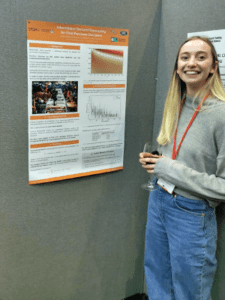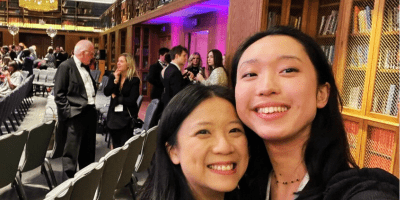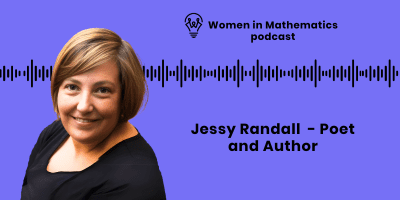Ros Azouzi is the executive director of the Institute of Mathematics and its Applications (IMA), a professional body and learned society for mathematicians in the UK. Before this role, she held various positions at the Royal Aeronautical Society over a 17-year period. The IMA’s mission is to advance mathematical knowledge and its applications for the public good, with a membership of over 5,000 mathematicians across different sectors and under Ros’s leadership, the IMA promotes collaboration, innovation, and excellence within the mathematical community.

“Now with data science raising the awareness really of what maths can do I think we’re starting to see exactly how important the role of mathematicians is, particularly in relation to the global challenges the planet faces.”
Flying high in aviation and then taking the helm at the IMA
After school and college, I went to university in the 90s and I did a degree in languages, economics and business at the University of Surrey. At the time I didn’t know what I wanted to do. I loved languages and I wanted to keep some form of maths. I was always interested in business so I chose economics.
After that, I went to live in the south of France. I’d been there on work placements as the University of Surrey offers lots of work placements, so I taught English in a local language school to all sorts of clients, including quite a few in the business sector, and interestingly some in aerospace and aircraft engineering, so there was another interest forming.
I came back to the UK in the early 2000s and became a placements officer at London Metropolitan University (London Met), which involved supporting students in their business school. They wanted to get work placements in aerospace, business, tourism, hospitality, that kind of thing. I also started to do a little bit of work with airlines for the tourism students.
I then saw a job advertised in the London Evening Standard to work for the Royal Aeronautical Society. I was particularly interested in professional bodies by that point, and the way they support and give networks to people. At London Met, we had a lot of students who were first-generation at university and didn’t have those connections. My enthusiasm and experience must have shone through as I was offered the role, which I was delighted to accept. I started working as a careers and education manager in 2009, and I stayed there for 17 years in various roles.

I worked on various projects, including one in particular that was very exciting, called the Schools Build-a-Plane challenge, where teams of pupils got to work on building and flying in a light aircraft. I also supported the society’s work on EDI and apprenticeships, helping with the trailblazer groups and endpoint assessment. So, by the time I left the Royal Aeronautical Society, I was head of skills and diversity.
I was interested in what my next step would be. For me, despite all the darkness, one positive that came from the pandemic was that I was able to work from home more and spend more time with my family. It was about this time I saw my current role as executive director with the IMA so I applied for it, I was successful, and I started the role in January 2022.
Role of the IMA
I lead the organisation and I’m directly responsible for ensuring the operations side is running smoothly and effectively, so I support the staff. We’re a small team of about 21 members of staff in total in a variety of roles from ensuring our membership is functioning smoothly, through to delivering education activities conferences, events and publications, so the typical work that we do in the professional body/learned society area.
I’m responsible for ensuring our finances are sound looking at the resource side of things and ensuring our activities are aligned with our strategy and our charitable objectives. We’re regulated, so I ensure the governance is in place and that we’re following those procedures and the Royal Charter. I have a team of people to help me with that as well.
Our work is about facilitating our network of our mathematician members. We foster partnerships and links to ensure that our members are well-represented and also that we can help, advise and support. It’s quite a varied role and there isn’t a typical day. You might have one day doing all your admin, your budgets, that sort of thing. The next you might be at a conference or an event. It’s very interesting, very varied.
In my experience in membership organisations, you get a feel for what you need to do. I always think when we’re recruiting, we’re always looking for people who can talk to anyone, deal with people at all levels, captains of industry and senior academics, right through to children, because of the nature of the organisation and its remit.
It is a regulated organisation, so you’ve got to be very careful you’re meeting those requirements. We’re a small organisation but we’re lucky as the biggest resource we have is our wonderful members. It’s my top priority to support them and help bring them to the fore.
Bringing together mathematicians to address global challenges
Mathematics is an underpinning subject to other specialist areas, such as engineering solutions or science that might contribute to healthcare. Maths has always been the foundation of many other subjects, but it’s a discipline in itself as well.
Now with data science raising the awareness really of what maths can do I think we’re starting to see exactly how important the role of mathematicians is, particularly concerning the global challenges the planet faces. So, for example, to understand climate change there’s the statistical analysis of how you can make things work, how you regulate networks or compare different resource options, right through to modelling solutions, engineering solutions or scientific solutions.
Maths offers quite a great way of being able to do these things quickly and at low cost as well. It’s such a powerful tool to have when you’re trying to deal with these challenges and you can get a group of mathematicians in a room. They can do some amazing modelling activities. (They do love chalk!) By the end of the session, they will have come up with some brilliant hypotheses that have the potential to create some amazing solutions.
What we’re doing at the IMA now is to create special interest groups in key areas to ensure we can help bring to the fore more and more of our mathematicians. It’s incredibly powerful to bring together groups of our members who share a particular interest because they’re so passionate about their specialisms as well.
During the pandemic in particular, the unique role mathematicians can play in society started to be understood by government and other big organisations. We’re excited about the opportunities this creates but at the same time, we’re dealing with serious issues and this is a huge responsibility It’s important we share that knowledge and expertise.
The future of maths education
The future of mathematics education is a very important issue as we know that everybody does maths, which is one of the things that’s different to engineering, where you don’t necessarily encounter that as a subject at school directly. We know everybody will do maths at school but not everybody continues maths, and there are many different reasons for that. We’re very lucky that we have a strong maths education community within the IMA. We have two committees, one that looks at schools and further education, and the other looks at higher education routes.
Those are independently chaired and they’re supported by our honorary secretary for education, Professor Cathy Hobbs. Cathy works alongside colleagues on fascinating papers on many topics relating to maths education, both in schools right through to HE.
We’re quite supportive of a recent Royal Society paper, which is recommending a full review of the curriculum for maths in schools. We’re very supportive of that work and we hope the government will listen because there is a need to show clearer links between maths and the future careers that young people will have. This particular paper looked at data science and we’re very supportive that maths education should be broad.
We want to ensure people can reach their potential, but there is that need to modernise as well. So, I’m passionate about supporting our members, particularly those in the education area who can provide more guidance, advice and support around modernising education because that’s an enormous challenge for any government and any administration in any country.
Further Mathematics
We want to make Further Mathematics available to more students. The ways people can access Further Mathematics. The AMSP (Advanced Mathematics Support Programme) is a DfE-funded programme aiming to increase participation in core maths, AS/A level mathematics and further mathematics, and support improvement in the teaching of these level 3 maths qualifications, but the programme isn’t available everywhere so there are some big challenges in the provision.
Another significant challenge is the issue of math anxiety. Despite mathematics being a popular subject at A-Level, many individuals don’t pursue it beyond GCSE due to negative experiences. This means there are likely many who aren’t reaching their full potential in maths, and even those who excel may not have all available options.
Introducing our dynamic lineup of female early-career mathematicians
Karrie Liu is one of our amazing early career mathematicians (ECMs). We call them ‘early career’ because they may not all necessarily be young, but they’re certainly up and coming. They may have had a career change or they may be straight out of school. They are all passionate about EDI and making a difference to mathematics.

Our current chair is Robyn Goldsmith, who is fabulous. We have a couple of women who rejuvenate the community each year. Another great one is Katherine Hamilton. She’s graduated from the University of Nottingham before going on to study for her MSc in Mathematics and Foundations of Computer Science the University of Oxford.
ECMs did a great event last year and one of the speakers was, Michelle Conway, who is lead data scientist at Lloyd’s Banking Group. She was so interesting and helpful, giving an incredible talk about her journey into maths and data science. She provided a great insight into what the differences are between maths and data science.
At the IMA, we have a Maths Careers website which provides valuable information. We recently featured Tobi George Oyediran, a quantitative financial analyst, and mathematician, as well as Teresa Senyah, a product developer for Maths Qualifications. Ruth Voisey, who is now CEO of the Smith Institute, is a notable mathematician leader. We’re also fortunate to have Professor Hannah Fry as our current president and work closely with talented individuals like Paige Pearson, a DSTL mathematician and Katie Steckles. We have also recently awarded great mathematicians like Professor Alison Etheridge OBE and Professor Julia Gog OBE prestigious medals which recognise both their work and leadership within the mathematics community and beyond.
How the Womanthology community can engage
I’d encourage the Womanthology community to engage with us on our social media — so that’s X (formerly known as Twitter), Instagram, Facebook and LinkedIn.
Coming up next

We have just launched a new strategy as well, so we’re focusing on getting projects up and running to deliver the new strategy post-launch. We have a new climate special interest group as well and we’re hoping to launch a foundation so we can start fundraising to support future grants, people and projects.





